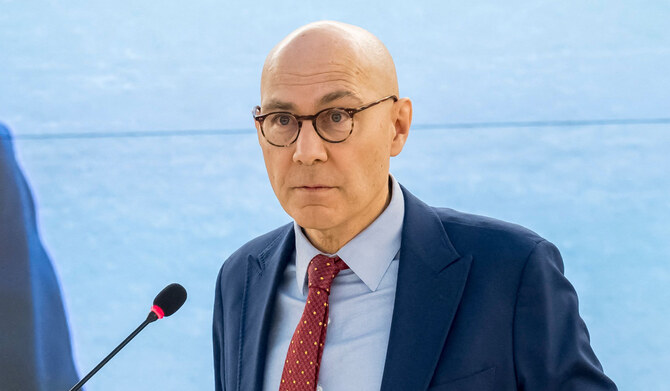CAIRO: Forces fighting alongside Sudan’s army said on Friday they had intercepted a substantial quantity of military supplies from a convoy destined for the rival Rapid Support Forces in North Darfur.
The RSF denied that a convoy had been attacked, telling Reuters the statement from the Joint Forces was “incorrect and mere lies.” Reuters was unable to verify the claims independently.
The Joint Forces, which include former rebel groups allied with the Sudanese army, accused the RSF of bringing in supplies for the indiscriminate shelling of neighborhoods in Al-Fasher, the army’s last holdout in the Darfur region, and Omdurman, as well as camps for displaced people.
BACKGROUND
At least 70 people have died from cholera and more than 2,200 have been infected in southern Sudan over the past week, Save the Children said on Thursday, citing Health Ministry data.
The RSF has launched repeated attacks in North Darfur, including at the famine-stricken Zamzam camp south of Al-Fasher earlier this month.
The RSF denies indiscriminate shelling of residential areas or targeting civilians and accuses the Joint Forces of using human shields.
The convoy, intercepted southeast of Al-Fasher, contained a large amount of military supplies, including 10,000 rounds of 40mm artillery shells, 12,000 rounds of howitzer shells, and various rockets and bombs, the Joint Forces statement said.
The Joint Forces said they also “neutralized” foreign mercenaries.
In recent months, the Joint Forces said they had intercepted Colombian mercenaries, prompting apologies from the South American country.
A power struggle between Sudan’s army and the RSF erupted into warfare in April 2023 ahead of a planned transition to civilian rule, triggering a massive displacement and hunger crisis.
On Thursday, the UN human rights chief Volker Turk warned of further escalation in Sudan and said there was a growing risk of deaths from starvation on a wide scale.
Sudan is facing the abyss and potentially hundreds of thousands of deaths unless the devastating war in the country ends and aid pours in, he warned.
Turk painted a bleak outlook for Sudan, where famine has already taken hold and millions have fled their homes amid intense fighting between rival forces.
“Sudan is a powder keg, on the verge of a further explosion into chaos, and at increasing risk of atrocity crimes and mass deaths from famine,” Turk warned the UN Human Rights Council.
He called the country “the world’s largest humanitarian catastrophe.”
“We are looking into the abyss. Humanitarian agencies warn that without action to end the war, deliver emergency aid, and get agriculture back on its feet, hundreds of thousands of people could die.”
Turk said more than 600,000 people were “on the brink of starvation,” with famine reported to have taken hold in five areas, including the Zamzam displacement camp in North Darfur.
Turk said five more areas could face famine in the next three months, while 17 are considered at risk.
He said an estimated 8.8 million people had been forced from their homes within Sudan, while 3.5 million more have fled across borders.
“This is the biggest displacement crisis in the world,” he said.
“Some 30.4 million people need assistance, from health care to food and other humanitarian support,” he said.
Presenting his annual report on the human rights situation in Sudan, Turk said some of the acts it documented may constitute war crimes and other atrocity crimes.
Turk said the Sudanese people had endured “unfathomable suffering and pain” since the conflict began, “with no peaceful solution in sight.”
Responding to the report, Sudanese Justice Minister Muawiya Osman blamed the RSF for starting the war and accused them of having “forced people out of their regions, humiliating them, and trying to cleanse specific regions from their original populations, just like West Darfur.”
He accused the RSF of “blocking humanitarian deliveries.”


























